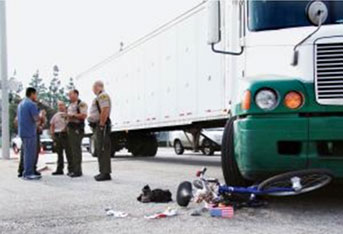Federal safety officials missed their own deadline Friday for making new rules about dangerous trucks.

October 28 was the original deadline by which the Federal Motor Carrier Safety Administration was supposed to announce new hours-of-service regulations for trucking, but in the end, they gave themselves another month to do it.
The pending change is the result of a lawsuit brought by Public Citizen, the Teamsters Union, Advocates for Highway and Auto Safety, and the Truck Safety Coalition against the FMCSA to tighten the standards. The suit resulted in an agreement that the FMCSA would change the current 11-hour driving day and the 34-hour rest period before starting a long workweek to a 10-hour driving day, keeping the 34-hour "restart" but with new restrictions.
The Bush-era rule has been struck down twice before by the courts, but the FMCSA kept reinstating it -- first in late 2007 and then about a year later. This time, the agency appears ready to make a change.
The 11-hour rule was a "midnight regulation" made during President George W. Bush's final days in office, according to the Teamsters. The Bush administration increased the workweek from 60 to 77 hours of driving and reduced the restart period from 50 hours to 34.
The Teamsters say truck crashes cost the nation $20 billion in 2009, and that truck driver fatigue is a major factor in truck crashes. Some statistics indicate fatigue is a factor in 30 to 40 percent of truck crashes, though the FMCSA itself puts the number at 5.5 percent.
“We will continue to push for a rule that protects truck drivers, instead of the greed of the trucking industry,” said Teamsters President Jim Hoffa when the court case was decided two years ago. “Longer hours behind the wheel are dangerous for our members and the driving public.”
The problem isn't limited to highways. Six percent of pedestrian fatalities and nine percent of bicyclist fatalities in 2009 were caused by crashes with large trucks, according to the NHTSA. Between 1996 and 2005, crashes with large trucks accounted for almost a third of all cyclist fatalities in New York City, according to a joint report by NYC agencies [PDF].
Industry lobbying groups including the American Trucking Associations and Owner-Operator Independent Drivers Association have mobilized against the changes. OOIDA says new safety rules would negatively impact not only "driver flexibility and the business operations of small-business truckers" but highway safety as well.
Some lawmakers have aligned with the trucking industry. Senator Kelly Ayotte (R-NH) has claimed that reducing the hours of service is "cost-prohibitive" and that the "impact on safety is unclear.” Republicans are uniformly against the changes, with everyone from House Speaker John Boehner and Majority Leader Eric Cantor to Transportation Committee Chair John Mica working "aggressively" to block any alteration to the hours-of-service provisions.
Transportation Secretary Ray LaHood has urged Congressional leaders to go along with the new safety rules, saying they apply "the most comprehensive and up-to-date data and analysis to the issue of driver fatigue and allowable hours of service" while allowing carriers “new operational flexibility.”





